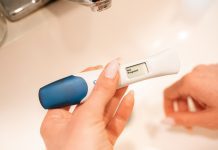Prior to becoming pregnant, I was a vegetarian. But a twin pregnancy plagued by terrible morning sickness and acid reflux quickly altered my dietary routine. Finding anything to eat that was appealing to me was a challenge, and I wasn’t gaining weight. In fact, the very thought of eating vegetables literally made me sick. After the first trimester I decided to eat whatever I could stomach in an attempt to start gaining weight. I accepted the fact that I wasn’t going to be able to adhere to my vegetarian diet. This meant a lot of mashed potatoes, Ensure, and an occasional turkey burger with pickles and brown mustard provided to me by my devoted husband.
The vegetarian diet in the U.S. has more recently found extreme popularity and acceptance. Although many cultures eat vegetarian diets and have perfectly normal pregnancies, there is still concern that eating vegetarian is not ideal for pregnancy. As a physician, I see more and more vegetarian and even vegan women who want to continue their diets during pregnancy, but who also want to know if they can have a healthy pregnancy. While the short answer is yes, very few obstetrical care providers understand how to effectively counsel the pregnant vegetarian and simply refer them to a nutritionist. Unfortunately, a nutritionist does not always understand the impact of pregnancy on the vegetarian woman. As a result, having a good understanding of what it means to be pregnant and vegetarian is essential.
Here is a preview of what you should consider if you are planning a non-dairy consuming “green” pregnancy ::
Folic acid
Folic acid deficiency can lead to neural tube defects in infants. Neural tube defects, such as spina bifida and anencephaly, occur when the neural tube does not close properly during the 4th – 6th weeks of pregnancy. The recommended dose of folic acid during pregnancy is 400 micrograms per day from a multivitamin or prenatal vitamin taken at least a month before conception, but most prenatal vitamins now contain 800 – 1000 micrograms. You can also get extra folic acid with foods high in folate, the natural form of folic acid. This includes dark green leafy vegetables, fortified grains and cereals, orange juice, dried beans, peas, fruits, enriched bread and pasta, and peanuts.
Vitamin B12
Having adequate vitamin B12 intake prior to conception is also important for proper neural tube development, as well as fetal growth and development. In addition, in a normally developing pregnancy, vitamin B12 levels may lower in the second and third trimesters of pregnancy due the expanding blood volume of the mother. You should consume 2.6 micrograms of vitamin B12 daily during pregnancy. Vitamin B12, found naturally only in animal products, can be found in enriched plant-based foods such as soymilk, tofu, nutritional yeast and cereal. There is evidence that B12 levels may be lower in pregnant women even when taking supplements. If there is concern that you are not getting enough vitamin B12, your provider can check your B12 level.
Iron and Protein
There is concern that the vegetarian will not consume enough iron and protein in her diet for a developing pregnancy. The amount of iron needed during pregnancy is 27 milligrams daily, which is found in most prenatal vitamin supplements. This amount increases as pregnancy progresses due to the dilutional anemia that occurs with your expanding blood volume. In addition, iron absorption is less with a vegetarian diet. The recommended amount of protein is 50 grams daily in the first trimester and 71 grams in the second/third trimester. You can get additional iron with whole and enriched grains, iron-rich veggies and legumes {spinach, lentils, white beans, kidney beans, chickpeas}, dried fruits {apricots, prunes, and raisins}, nuts, and blackstrap molasses, along with foods containing vitamin C {oranges and strawberries} to maximize iron absorption. Additional protein is gained with many of the previously mentioned foods in addition to soy products. If you don’t consume enough iron during pregnancy, iron deficiency anemia may develop, which can lead to worsening anemia after delivery, preterm labor and delivery, and low birth weight.
Calcium and Vitamin D
Appropriate consumption of calcium and vitamin D is important in the green pregnancy. The recommended amount of calcium is 1000 milligrams daily. If you are a vegetarian who does not consume dairy, eating dark leafy greens {collards, kale}, bok choy, broccoli, sunflower/sesame seeds, figs, beans, and fortified cereals, juices, tofu and nondairy milks will afford you the needed amount of calcium during pregnancy. You can also consider a calcium supplement. The daily recommended dose of vitamin D is 600 IU of vitamin D {most prenatal vitamins have 400 IU}. Vitamin D is obtained through sunlight exposure and some soy milks and breakfast cereals. If there is a concern that you are vitamin D deficient, your level can be checked and a supplement added if needed.
Essential Fatty Acids
Essential fatty acids [Omega 3/N-3 {DHA, EPA} and Omega 6/N-6] are important for the development of the fetal brain, eyes, and the immune and nervous systems. The recommended amount of N-3 fatty acids is 1.4 grams daily. Because Americans tend to be deficient in essential fatty acids, many prenatal vitamins now have an additional capsule of fish oil {EPA and DHA}. You can also get additional DHA with algae oil. The recommended amount of DHA in pregnancy is 300 milligrams daily. Even with a DHA supplement, however, N-3 fatty acids are more likely to be low during pregnancy. You can increase your intake with plant foods like flaxseed, walnuts, soybeans, mungo beans {urid} and canola, walnut and soy bean oils. N-6 fatty acids are typically sufficient in the vegetarian diet and are found in seeds, nuts, grains, legumes, green leafy vegetables and vegetable oils like corn, soybean, sesame and sunflower.
Other Considerations
*Discuss your dietary preferences with your obstetrical care provider and let him/her know of any supplements you are taking.
*Understand what may be lacking in your diet and what may need to be supplemented. Keeping a dietary log for a week or two may help you gain more perspective.
*Proper weight gain is especially important in the green pregnancy. If you are gaining a healthy amount of weight while maintaining a vegetarian diet, then your baby is likely gaining weight appropriately. However, your obstetrical care provider may want to schedule routine growth ultrasounds throughout pregnancy to ensure the baby is growing.
*There is some concern that vegetarian mothers have an especially increased risk of vitamin B12, calcium, and iron deficiencies. Overall, you should pay close attention to your intake of vitamins and trace elements. This may require that you take additional supplements. In addition, taking a prenatal vitamin with DHA before conception is strongly recommended.
*If you find yourself unable to adhere to your vegetarian diet during pregnancy for any reason, it is OK. You can always resume after delivery. In the end, you need to do whatever is necessary to ensure a healthy pregnancy.
Now that you have an idea of what to eat in your green pregnancy, here are my recommendations of where to eat it in HTX!
My top 5 picks for family-friendly vegetarian/vegan restaurants are ::
- Hungry’s in Rice Village :: This is a family run restaurant with an expanding menu including delicious vegetarian and vegan options and daily vegan specials. Brunch is served Saturday and Sunday from 9am to 3pm. There is a huge, airy outdoor patio and beautiful interior seating that are both great for the kiddos. I recommend the hummus sampler, tostada salad, veggie organic quinoa and kale burger, and brussels sprouts wood stone pizza. Valet parking is offered.
- True Food Kitchen in the Galleria :: They offer a seasonal rotating menu with numerous vegetarian, vegan and gluten-free menu options. Brunch is offered Saturday and Sunday from 10am to 4pm. There is plenty of indoor seating that easily accommodates high chairs. I recommend the farms market crudités, mediterranean quinoa salad, ancient grains bowl, brussels sprout and mushroom pizza, and inside out quinoa burger. Valet parking is offered.
- Green Vegetarian Cuisine in Bellaire :: They serve delicious and affordable vegetarian comfort food with an expansive menu for vegetarians and vegans. Sunday brunch is served from 10am-1pm. There is indoor seating that is kid-friendly. I recommend the cauliflower hot wings, monk’s bowl, classic burger, french fries, and quinoa burrito.
- Green Seed Vegan in the Third Ward :: This menu is 100% vegan and soy free with gluten free options. They even offer raw vegan options. There is limited indoor seating, but that is never a problem for us. We order take-out and have a family dinner at home. I recommend the garden fresh panini, green seed urger, any of the gluten free vegan desserts or cold-pressed raw juices, but DO NOT leave with out trying the cauliflower nuggets. They are my favorite side any where, any time, any place.
- Local Foods in Heights Mercantile :: This is a new location located in the Heights along a bike path. They offer a seasonal menu with locally sourced ingredients. There are multiple options for vegetarians and vegans. Weekend brunch is offered from 10am to 2pm. There is a huge outdoor, dog-friendly patio and plenty of indoor seating for the entire family. I recommend the garden sammie, vegan chili con queso, taco salad with tempeh, kale salad side, and falafel sandwich.
Of note, several of these restaurants offer a kid’s menu. However, we rarely order from a kid’s menu for the twins. We opt to order from the adult menu and share with them so we are all eating the same foods.
If you want more information on the vegetarian and vegan diet in pregnancy visit The Physicians Committee for Responsible Medicine, Cleveland Clinic, and Can you have a healthy vegetarian or vegan pregnancy? in the NY times {featuring yours truly}.















